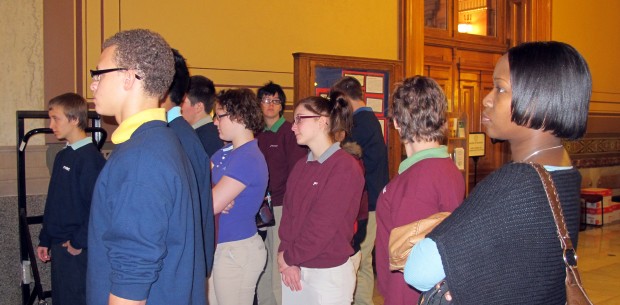Indiana Supreme Court Hears Oral Arguments In Challenge To Voucher Law

Elle Moxley / StateImpact Indiana
Students from Paddock View Residential Center watch the live feed outside the Indiana Supreme Court during oral arguments in a challenge of the state's voucher law. The private school is one of 289 participating in the Choice Scholarship Program.
The State Supreme Court heard oral arguments Wednesday morning in a challenge of the state’s voucher law. Indiana State Teachers Association Vice President Teresa Meredith and a group of parents and teachers filed the suit because they say providing state support to private, religious schools is unconstitutional.
More than 9,000 students are participating in the two-year-old program, which allows students to attend private schools using state-funded vouchers. Nearly all of the 289 schools that accept vouchers are religious.
Indiana’s constitution says money from the treasury shouldn’t be used for the benefit of any religious or theological institution. But Justice Mark S. Massa questioned how the Choice Scholarship Program was different than initiatives that allow students to use state grants at religious universities.
“You seem to have conceded that it’s perfectly fine for an Indiana high school graduate to use O’Bannon money or 21st Century Scholar money to go to Notre Dame, but his younger sister can’t use CSP money to go to St. Matthews,” Massa said during the hearing.Lawyers for the state argue taxpayer dollars aren’t going directly to religious schools because parents still choose where to use the vouchers.
Yet Justice Robert D. Rucker questioned why few of the state’s secular private schools were participating in the Choice Scholarship Program.
“But how do you respond to the question that this choice is really a false choice?” Rucker asked. “If the only institutions that are available are 100 percent religious institutions, how can you say it’s not direct aid? I mean, as a practical matter.”
The Indiana Supreme Court assumed jurisdiction of the case earlier this year after a Marion County judge upheld the law.
“It always looks like some kind of a fight, but in fact, it’s really just the way we see whether if we’ve performed according to the requirements of the constitution,” says Attorney General Greg Zoeller.
Outgoing State Superintendent Tony Bennett voiced his support for the program after the hearing.
“I think it was pretty well articulated that school choice is not just for the wealthy,” says Bennett. “The fact is, every child in this state, regardless of their race, regardless of how much money their parents have in their checking accounts, should have an opportunity to pursue an education that meets their child’s needs.”
Superintendent-elect Glenda Ritz is a plaintiff in the case but says she plans to withdraw so there won’t be a conflict of interest when she takes office in January.
Other opponents of the voucher law say a mass exodus of students to private school will hurt public school districts. More than 1,500 students have left Fort Wayne Community Schools for private schools in the area. Board of Trustees President Mark GiaQuinta says his district is already feeling the effects of vouchers.
“We have lost seven million dollars of our budget to vouchers, not because students are leaving poor schools,” says GiaQuinta. “As a matter of fact, Arlington Elementary School is the school in our district that has lost more students than any other, and it is an A-rated school.”

